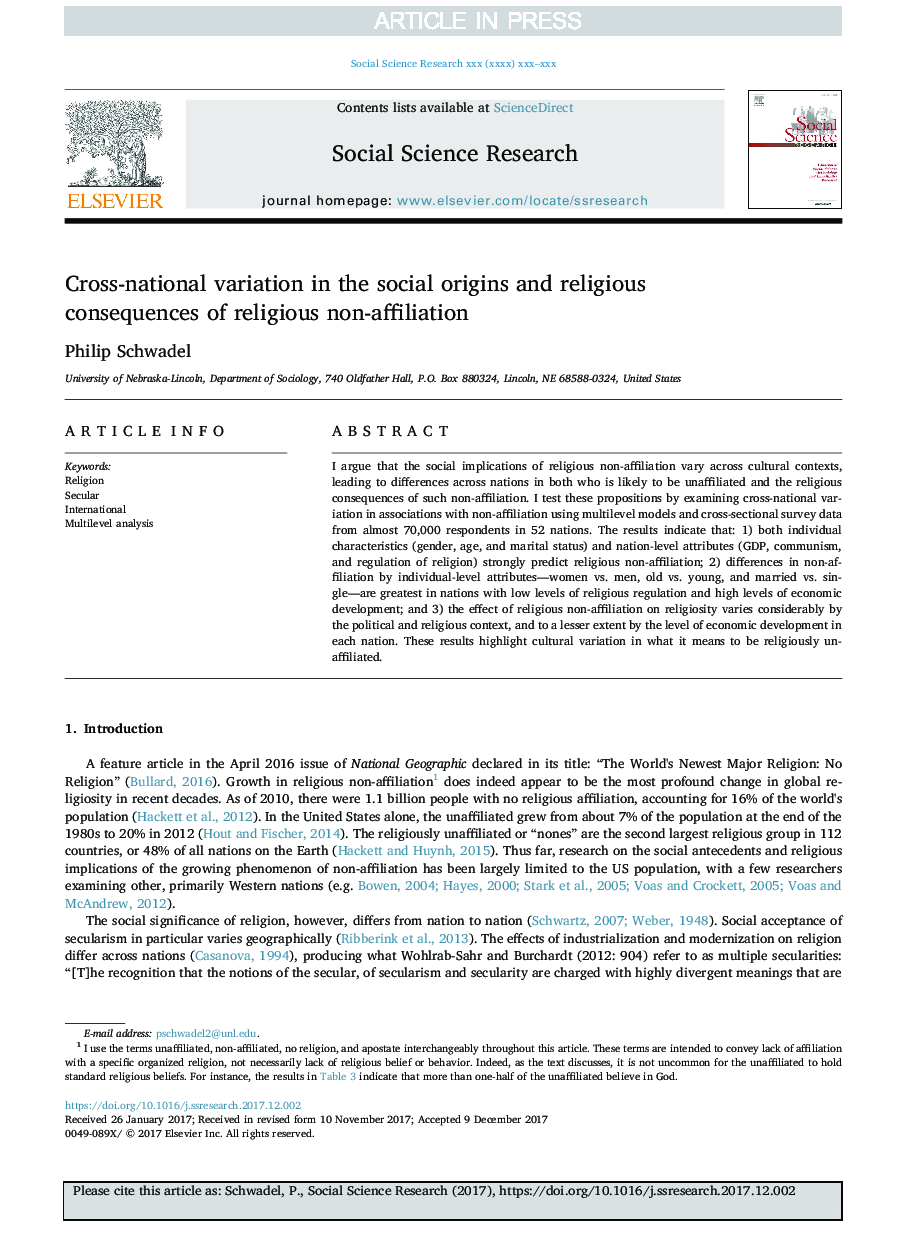| کد مقاله | کد نشریه | سال انتشار | مقاله انگلیسی | نسخه تمام متن |
|---|---|---|---|---|
| 7338838 | 1476105 | 2018 | 17 صفحه PDF | دانلود رایگان |
عنوان انگلیسی مقاله ISI
Cross-national variation in the social origins and religious consequences of religious non-affiliation
ترجمه فارسی عنوان
تنوع بین نژادی در ریشه های اجتماعی و پیامدهای ناشی از عدم وابستگی مذهبی
دانلود مقاله + سفارش ترجمه
دانلود مقاله ISI انگلیسی
رایگان برای ایرانیان
کلمات کلیدی
دین، سکولار، بین المللی، تجزیه و تحلیل چندسطحی،
ترجمه چکیده
من استدلال می کنم که مفاهیم اجتماعی عدم وابستگی مذهبی در حوزه های فرهنگی متفاوت هستند، که منجر به تفاوت های بین ملل در هر دو کشور می شود که احتمالا وابسته به آن هستند و پیامدهای مذهبی چنین غیر وابستگی. من این گزاره ها را با بررسی تنوع بین المللی در ارتباط با عدم وابستگی با استفاده از مدل های چند سطحی و بررسی مقطعی از نزدیک به 70،000 پاسخ دهنده در 52 کشور، تست می کنم. نتایج نشان می دهد که: 1) هر دو ویژگی فردی (جنسیت، سن و وضعیت تاهل) و ویژگی های ملی (تولید ناخالص ملی، کمونیسم و تنظیم دین) به شدت از عدم وابستگی مذهبی پیش بینی می کنند؛ 2) تفاوت در عدم وابستگی به ویژگی های فردی-زنان در مقابل مردان، پیر در مقابل جوانان و ازدواج در مقابل تنها در کشورهای با سطوح پایین نظم مذهبی و سطوح بالای توسعه اقتصادی؛ و 3) تأثیر عدم وابستگی مذهبی به دینداری، بطور قابل ملاحظه ای با زمینه سیاسی و مذهبی و به میزان کم توسعه اقتصادی در هر ملت، متفاوت است. این نتایج، تغییرات فرهنگی را در آنچه که به معنای عدم وابستگی مذهبی است، برجسته می کند.
موضوعات مرتبط
علوم انسانی و اجتماعی
روانشناسی
روانشناسی اجتماعی
چکیده انگلیسی
I argue that the social implications of religious non-affiliation vary across cultural contexts, leading to differences across nations in both who is likely to be unaffiliated and the religious consequences of such non-affiliation. I test these propositions by examining cross-national variation in associations with non-affiliation using multilevel models and cross-sectional survey data from almost 70,000 respondents in 52 nations. The results indicate that: 1) both individual characteristics (gender, age, and marital status) and nation-level attributes (GDP, communism, and regulation of religion) strongly predict religious non-affiliation; 2) differences in non-affiliation by individual-level attributes-women vs. men, old vs. young, and married vs. single-are greatest in nations with low levels of religious regulation and high levels of economic development; and 3) the effect of religious non-affiliation on religiosity varies considerably by the political and religious context, and to a lesser extent by the level of economic development in each nation. These results highlight cultural variation in what it means to be religiously unaffiliated.
ناشر
Database: Elsevier - ScienceDirect (ساینس دایرکت)
Journal: Social Science Research - Volume 70, February 2018, Pages 254-270
Journal: Social Science Research - Volume 70, February 2018, Pages 254-270
نویسندگان
Philip Schwadel,
